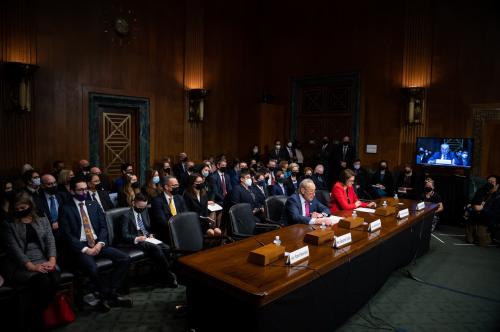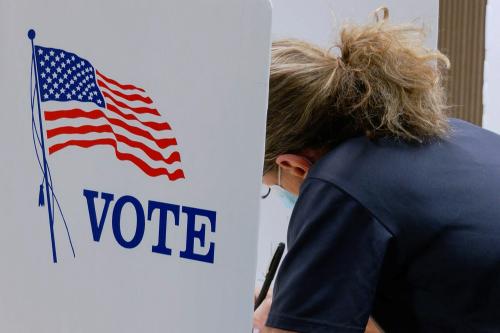

According to data released today by the Brookings Institution’s Presidential Appointee Initiative (PAI), the Senate is largely to blame for delays complicating the completion of the Bush administration’s first round of cabinet and subcabinet appointments.
“The Bush administration will pay the price of these Senate-born delays,” states Paul C. Light, senior adviser to the Presidential Appointee Initiative. “This administration is now all but guaranteed to be the slowest in modern history to complete its first round of appointments.”
On Tuesday, July 23, the Senate confirmed a Bush administration executive branch nominee for the first time in forty-three consecutive sessions over 76 days. This confirmation drought is the longest in the past seven Congresses, dating back to 1989. By comparison, the longest confirmation drought experienced in the Clinton administration was thirty sessions over 48 days in 1995, while the longest in the first Bush administration was twenty-one days over 35 days in 1991.
Light noted that one nominee, the undersecretary for Rural Development, had been waiting 451 days for confirmation, two nominees (both for the U.S. Parole Commission) had been waiting 300 days, and 14 had been waiting at least 200 days. “It’s clearly time to parole the nominees to the Parole Commission,” Light argued.
The Presidential Appointee Initiative data shows that the bulk of the problem is outside the administration’s direct control.
“The Bush administration is doing its best to stay on pace, but the Senate is clearly slowing down. It’s time to end the drought,” Light urged. He noted that the Bush White House had made 1,195 executive and judicial nominations as of July 23, besting the Clinton administration by 200 nominations during the same period in 1993-1994, and the first Bush administration by 378.
“According to data collected by PAI, the White House has actually picked up speed in moving nominations to Capitol Hill since September 11, while the Senate has slowed down,” he stated. In part, Light attributes the Senate lag to a number of factors, including the changing political dynamic in the Democratic-controlled Senate and the focus on new legislative priorities following the events of September 11.
THE APPOINTMENTS PROCESS: PRE- AND POST-SEPTEMBER 11
| Average Number of Days | From Announcement to Nomination | From Nomination to Confirmation | From Announcement to Confirmation |
| Before September 11 | 34 | 55 | 89 |
| After September 11 | 32 | 61 | 93 |
Eighteen months into the administration, 98 of the president’s 513 top executive branch jobs remain vacant. Of the 98 vacancies, 63 have nominees awaiting Senate confirmation, another 4 have candidates but have not been formally nominated, and 31 have no candidates in sight.
Among the positions awaiting confirmation as of July 23 are the deputy secretary of State for Management and Resources, and the assistant administrator of EPA for Enforcement and Compliance. Among the positions still awaiting nomination of a candidate are the deputy administrator of the Federal Emergency Management Agency, the commissioner of Food and Drugs, and the deputy administrator of the Federal Aviation Administration.
Light stated: “The Senate can make up for their inaction not only by dealing with the backlog, but by acting on S. 1811, the Presidential Appointments Improvement Act, and by enacting a Senate rule agreeing to an up-or-down vote on nominees within 45 days of the nomination being forwarded to the Senate.” As of July 23, 2002, the 63 current nominees have waited an average of 125 days for confirmation.
The average time to fill a Senate-confirmed position in the Bush administration from inauguration day to confirmation is 8.3 months. This lag time is sure to lengthen as the Senate prepares to recess with a backlog of nominees unlikely to be reduced much before the August break.
Looking at the start of previous administration, the average time to fill a Senate confirmed position was 8 months in the Clinton Administration, 8.1 months in the first Bush administration, 5.3 months in the Reagan administration, and 2.4 months in the Kennedy administration.
Last year, PAI issued a set of 11 bipartisan recommendations to improve the appointments process. More than 350 former appointees from the Reagan, Bush, and Clinton administrations, including 19 former Cabinet secretaries, signed a “Nominee’s Bill of Rights” in 2001 asking Congress and the White House to treat all presidential appointees with fairness, courtesy and respect.
ABOUT PAI
The Brookings Institution established the Presidential Appointee Initiative in 1999 with funding from The Pew Charitable Trusts. The initiative is supported by a distinguished advisory board co-chaired by Franklin D. Raines, Chairman and CEO of Fannie Mae and former Director of the Office of Management and Budget, and Kenneth M. Duberstein, Chairman and CEO of The Duberstein Group and former Chief of Staff to President Ronald Reagan. To learn more about the Presidential Appointee Initiative, or order copies of its reports, visit www.appointee.brookings.org.
For interview requests with Paul C. Light, senior adviser to the Presidential Appointee Initiative, please contact Gina Russo at (202) 797-6405, or [email protected].

Sarah A. Binder, Naomi Maehr, Sarah Devendorf
September 23, 2024

Barry G. Rabe
September 19, 2024

Stephanie K. Pell
September 19, 2024